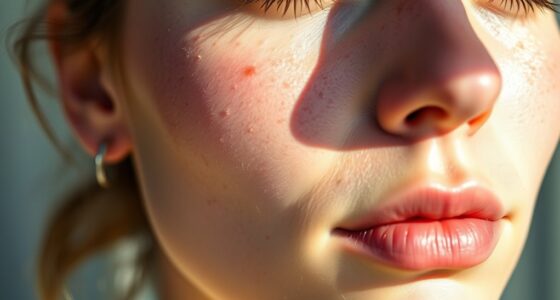Antioxidants play a vital role in helping your skin recover from sun damage by neutralizing free radicals caused by UV radiation. They support your skin’s natural healing process, reduce inflammation, and repair cellular damage. Using antioxidant-rich skincare or eating foods like berries and nuts can strengthen your skin’s resilience and prevent premature aging. To learn more about how antioxidants protect and restore your skin after sun exposure, keep exploring these helpful details.
Key Takeaways
- Antioxidants neutralize free radicals generated by UV exposure, reducing skin damage and aging signs.
- They support cellular repair and regeneration, accelerating skin healing after sun damage.
- Topical antioxidants, like vitamins C and E, enhance skin resilience and diminish inflammation caused by sunlight.
- Consuming antioxidant-rich foods boosts internal defenses, complementing external skin recovery efforts.
- Regular antioxidant use helps prevent long-term damage and maintains a youthful, healthy complexion.

Antioxidants play a crucial role in skin recovery by neutralizing free radicals that cause damage and accelerate aging. When your skin is exposed to sunlight, UV radiation penetrates the layers of your skin, generating free radicals that damage cells and DNA. This process leads to UV damage, which manifests as sunburn, dark spots, wrinkles, and loss of elasticity. Without proper intervention, this damage hampers your skin’s ability to heal effectively, making antioxidants essential for recovery. By fighting off these harmful molecules, antioxidants help reduce inflammation and repair cellular structures, supporting your skin’s natural healing process.
You might not realize it, but every time you step into the sun, your skin undergoes oxidative stress. The more UV exposure you get, the more free radicals your skin produces. These unstable molecules attack healthy skin cells, impairing their function and delaying repair. That’s where antioxidants come into play—they act as a defense system, donating electrons to stabilize free radicals and prevent further cellular damage. This neutralization not only halts ongoing harm but also creates an environment conducive to skin healing. Over time, consistent antioxidant use can help reverse some of the visible effects of UV damage, such as pigmentation irregularities and fine lines.
Incorporating antioxidants into your skincare routine can notably improve your skin’s resilience against sun damage. Vitamins C and E are particularly effective—they boost collagen production, brighten your complexion, and protect against future UV harm. Using antioxidant-rich serums or creams before and after sun exposure can make a noticeable difference in how quickly your skin recovers. These protective agents also support the regeneration of damaged skin cells, helping to restore your skin’s barrier and reduce redness, swelling, and irritation caused by UV rays. Remember, though, that antioxidants are most effective when paired with other sun protection measures like broad-spectrum sunscreens and protective clothing.
Beyond external applications, maintaining a diet rich in antioxidant foods—such as berries, nuts, and leafy greens—can strengthen your skin’s ability to heal from UV damage. Proper nutrition supplies your body with the necessary nutrients to combat oxidative stress from within. Incorporating antioxidant-rich foods into your diet supports cellular repair and overall skin health. The combination of topical antioxidants and a healthy diet creates a powerful defense against sun-related skin issues. In the long run, prioritizing antioxidants in your skincare and nutrition routines not only accelerates skin healing but also helps prevent premature aging and long-term damage caused by UV exposure. With consistent care, you can support your skin’s natural resilience and maintain a healthier, more youthful complexion.
Frequently Asked Questions
Can Antioxidants Completely Prevent Sun Damage?
Antioxidants can’t completely prevent sun damage, but they do help protect your skin. Sun protection like sunscreen and wearing protective clothing are essential. Antioxidants support skin hydration and fight free radicals caused by UV rays, reducing damage. However, for full protection, combine antioxidants with sun protection measures. This way, you enhance your skin’s resilience and minimize the risk of long-term harm from sunlight exposure.
Which Antioxidants Are Most Effective for Skin Recovery?
You should focus on antioxidants like vitamin C, vitamin E, and polyphenols, as they are most effective for skin recovery. These antioxidant types support your skin’s repair mechanisms by neutralizing free radicals caused by sun exposure. Applying topical forms or consuming foods rich in these antioxidants boosts your skin’s ability to repair damage, reduce inflammation, and promote healing, helping your skin recover faster after sunlight exposure.
How Long Does It Take to See Results From Antioxidants?
You might see visible improvements from antioxidants in as little as a few weeks, but timing expectations can vary like a sunrise—some days brighter than others. Consistent use fuels the process, gradually turning dull, sun-damaged skin into a healthier glow. Stay patient and committed, knowing that antioxidants work behind the scenes, quietly restoring your skin’s resilience until you notice a refreshed, more youthful appearance.
Are Natural or Synthetic Antioxidants Better for Skin Healing?
You should consider natural antioxidants as generally better for skin healing because they’re often richer in nutrients and less processed. Topical natural antioxidants directly target damaged skin, providing immediate benefits, while oral supplements support overall recovery. Synthetic antioxidants can be effective but may carry risks or fewer nutrients. For best results, combine topical natural antioxidants with oral intake, tailoring your approach to your skin’s specific needs.
Can Antioxidants Reverse Existing Sun Damage?
Antioxidants like Vitamin E can help repair some sun damage by neutralizing free radicals, but they can’t fully reverse it. You can protect your skin and support healing by using antioxidant-rich products, reducing further harm. Keep in mind, consistent use is key, and for significant damage, consult a dermatologist for treatments that can better restore your skin’s health.
Conclusion
By now, you see how antioxidants play a crucial role in helping your skin recover from sun damage. They combat free radicals, reduce inflammation, and promote healing, giving your skin a fighting chance against UV harm. So, next time you spend time outdoors, ask yourself: aren’t your skin’s recovery and health worth the extra care? Incorporate antioxidants into your routine and give your skin the support it needs to stay resilient and radiant.









